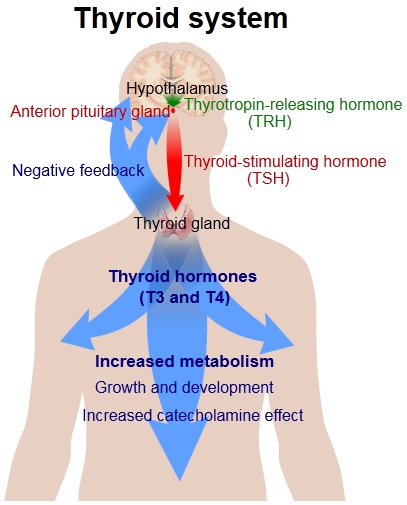Hypothyroidism is a disorder in which the thyroid gland does not produce enough thyroid hormone. Conversely, Hyperthyroidism is a disorder in which the thyroid gland produces and secretes excessive amounts of thyroid hormones. Essentially what this means is that hypothyroidism can cause a woman’s bodily functions to slow down, while hyperthyroidism does the opposite; it causes the bodily function of a woman to speed up.
As thyroid hormone serves an important role during pregnancy, both in the development of a healthy baby and in maintaining the health of the mother, both disorders can naturally hinder a woman’s menstrual cycle, which in turn can affect her ability to ovulate, making it difficult to conceive.
Hypothyroidism is a disorder in which the thyroid gland does not produce enough thyroid hormone and hyperthyroidism works contrary.
Thyroid disease is highly prevalent in women of child-bearing age.
What Is The Thyroid Gland?

thyroid Hypothyroidism and hyperthyroidsm : image wikipedia
The thyroid gland or simply, the thyroid, is one of the largest endocrine glands. The thyroid gland is found in the neck, below the thyroid cartilage. It’s a 2-inch-long gland in the shape of a butterfly and weighs about 15 grams. The thyroid gland controls how quickly the body uses energy, makes proteins, and controls how sensitive the body is to other hormones. It participates in these processes by producing thyroid hormones, the principal ones being triiodothyronine (T3) and thyroxine which can sometimes be referred to as tetraiodothyronine (T4).
Effects of Pregnancy on Thyroid Functions
The human chorionic gonadotropin (hCG) and estrogen are two hormones related to pregnancy. These hormones can cause the level of thyroid hormone in the blood to increase. hCG mildly stimulates the thyroid to produce more thyroid hormone. While increased estrogen produces higher levels of thyroid-binding globulin, a protein that transports thyroid hormone in the blood.
What this means is that thyroid hormone is vital to the normal development of the baby’s brain and nervous system. And any thyroid disorder (too high or too low) can have a significant impact on the fetal and maternal health. The fetus is dependent on the mother’s supply of thyroid hormone during the first trimester. Only at around 12 weeks, the baby’s thyroid begins to function on its own.
The thyroid normally enlarges slightly in healthy women during pregnancy, but a noticeably enlarged thyroid can be a sign of thyroid disease and should be examined further.
What Causes Hyperthyroidism in Pregnancy?
Hyperthyroidism in pregnancy is usually caused by Graves’ disease and occurs in about one of every 500 pregnancies. Graves’ disease being an autoimmune disorder. Normally, the immune system protects people from infection by identifying and destroying bacteria, viruses, and other potentially harmful foreign substances. But in autoimmune diseases, the immune system attacks the body’s own cells and organs.
With Graves’ disease, the immune system makes an antibody called thyroid-stimulating immunoglobulin (TSI), sometimes called TSH receptor antibody, which mimics TSH and causes the thyroid to make too much thyroid hormone. In some people with Graves’ disease, this antibody is also associated with eye problems such as irritation, bulging, and puffiness. Pregnant women with Graves’ disease should be monitored monthly.
What Causes Hypothyroidism in Pregnancy?
Hypothyroidism in pregnancy is usually caused by Hashimoto’s disease and occurs in three to five out of every 1,000 pregnancies. Hashimoto’s disease is a form of chronic inflammation of the thyroid gland.
Like Graves’ disease, Hashimoto’s disease is an autoimmune disorder. In Hashimoto’s disease, the immune system attacks the thyroid, causing inflammation and interfering with its ability to produce thyroid hormones. Hypothyroidism in pregnancy can also result from existing hypothyroidism that is inadequately treated or from prior destruction or removal of the thyroid as a treatment for hyperthyroidism.
Symptoms of Hypo and Hyper Thyroidism
Thyroid problems can be difficult to diagnose in pregnancy due to higher levels of thyroid hormone in the blood. There are however some telltale signs to look out for in case of a thyroid disorder, as follows:
1. Fatigue: While fatigue is common in pregnancy, excessive fatigue may be a warning sign. If you wake up feeling as if 8 or 10 hours of sleep a night is insufficient, or being unable to function all day without a nap, this can be a sign of thyroid problems.
2. Muscle and joint pain: These sorts of aches and pains can be normal during pregnancy, but it’s a good idea to get checked out just in case.
3. Hair and skin changes: The hair and skin are particularly vulnerable to thyroid conditions. Brittle, dry hair that is prone to breakage or falling out is a warning sign of hypothyroidism, as is skin that becomes thick, coarse, dry or scaly.
4. Neck changes: Does your neck feel a little different? A feeling of swelling in the neck, discomfort with turtlenecks or neckties, a hoarse voice or a visibly enlarged thyroid can all be signs of a ‘goiter ’— an enlarged thyroid gland that is a symptom of thyroid disease.
Effects of Hypo and Hyper Thyroidism on the Mother and Baby
Uncontrolled hyperthyroidism during pregnancy can lead to:
• Congestive heart failure
• Preeclampsia—a dangerous rise in blood pressure in late pregnancy
• Thyroid storm—a sudden, severe worsening of symptoms
• Miscarriage
• Premature birth
• Low birth weight
Treatments
Once a thyroid disease has been diagnosed, your physician will opt to treat hyperthyroidism with antithyroid medication. Hypothyroidism is treated with a synthetic thyroid hormone called thyroxine. In addition, doctors recommend that pregnant women affected by thyroid disease maintain a good diet, and be sure to include iodine, coconut oil, omega-3 fatty acids, antioxidants and B vitamins. Also, pregnant women should make it a point to avoid aspartame, non-fermented soy and, if possible, gluten.
Above all else, consult your physician if you suspect that your thyroid hormones are out of whack. Don’t self-diagnose — both the test and the treatment are easy, and can make a huge difference in your health, as well as the health of your baby.
More references :
1. Wikipedia : Thyroid hormones, Chorionic Gonadotropin, Graves’ & Hashimoto’s disease
2. Tulane.edu : Thyroid hormones



 Saving...
Saving...